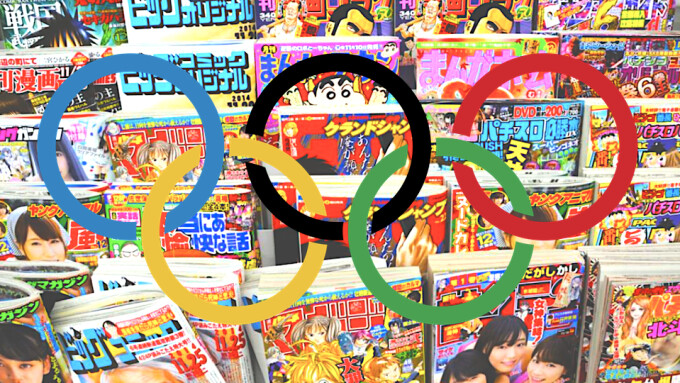TOKYO — Social pressure surrounding the upcoming Tokyo Olympics has resulted in distribution troubles for traditional Japanese adult magazines, which have drastically harmed the already dwindling sector.
According to a report by Hanako Montgomery published today by Vice's international news unit, “in the years since Japan won the bid to host the 2020 games, complaints mounted that the magazine covers were offensive to women and inappropriate in front of children.”
In the years leading up to the games’ original date of Summer 2020, “some of the country’s biggest convenience store chains — MiniStop, Lawson and 7-Eleven — said they would stop selling the publications altogether, accelerating the titles’ demise.”
The Tokyo Olympic Games were postponed to July 23-Aug 8, 2021, due to the COVID-19 pandemic.
Fear of Being Seen as 'Underdeveloped'
Mongomery interviewed Akira Ikoma, editor-in-chief of the porn magazine My Journey, who said Japan is “hiding this part of the culture because they’re embarrassed.”
“Even sex stores with really dirty signs have been made to change or get rid of them in preparation for the Olympics,” Ikoma added. “They have to make Japan look like a developed country, and if they have these magazines out, the society looks underdeveloped.”
As with their U.S. counterparts, convenience stores (“conbini”) were traditionally a leading channel of adult magazine distribution.
But bowing down to public pressure — with “save the children” campaigns that echo NCOSE’s long-running efforts to ban any magazine that discusses sexuality or shows swimsuit and underwear models from all American drugstores and supermarkets (e.g., Cosmopolitan, Sports Illustrated) — Japanese convenience stores chain have used the Olympics as an excuse for their “moral cleanup” efforts.
Last year, as rumors spread of the Olympics having to be cancelled, the Lawson chain stuck to their decision and recently told Vice that a cancellation of the games would have had “no effect on the discontinuation of conbini porn.”
Censorship Aims to Protect 'the Image of Japan'
In January 2019, the Japan Times reported that the three aforementioned — and largest — convenience chain operators planned to remove pornographic magazines from their store shelves across the nation by the end of August that year.
One of the chains, FamilyMart, cast the censorship decision as something of a feminist gesture pitching “adult magazines for men” against “an increasingly diversified customer base.”
Another chain, Lawson, told the Japan Times that while previously their “main customers were men in their 20s and 30s,” more recently “we’ve seen more elderly people, women and children shopping at our stores.”
The spokesperson for Lawson alleged that “a surge in the number of international travelers coming to their stores these days” meant that “displaying sexually explicit magazines restricted to those aged 18 or older in stores could hurt the image of Japan.”
Both 7-Eleven and FamilyMart acknowledged that some franchisees might decide to continue selling adult magazines to retain their profitability.







